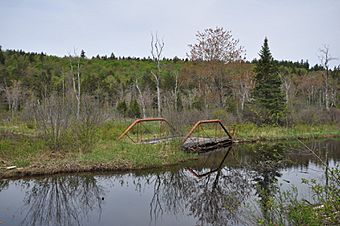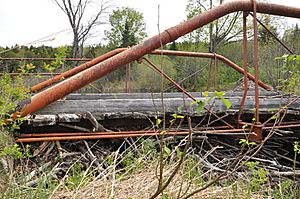Coleman Bridge (Windsor, Massachusetts) facts for kids
Quick facts for kids |
|
|
Coleman Bridge
|
|

Coleman Bridge, 2015
|
|
| Location | Windsor, Massachusetts |
|---|---|
| Area | less than one acre |
| Built | c. 1894 |
| Architect | Ball, Charles H. |
| Architectural style | Iron pipe (Ball patent) truss |
| NRHP reference No. | 00000112 |
| Added to NRHP | February 18, 2000 |
The Coleman Bridge is a very old and special bridge located in Windsor, Massachusetts. It's known for being a "Ball-patent pipe pony truss bridge." This means it uses metal pipes as its main support beams, and it doesn't have a top structure over the road. It's the only bridge of its kind still standing in its original spot!
The bridge is found on an old part of Windsor Bush Road. This road crosses a stream called Phelps Brook. The bridge got its name because it was near farms owned by the Coleman family a long time ago.
What Makes the Coleman Bridge Special?
The Coleman Bridge is unique because of its design. It uses a special method invented by Charles H. Ball. He was an inventor and builder from a nearby town called Peru. He came up with the idea of using strong metal pipes to build bridges over smaller rivers and streams.
- Only three bridges of this exact type are known to have ever existed.
- The other two were taken apart and stored, so the Coleman Bridge is the only one you can still see in its original place.
Who Built This Unique Bridge?
Charles H. Ball probably built the Coleman Bridge in the 1890s. This was when he was building a lot of bridges. He often worked for the Windsor highway department, helping to build roads and bridges in the area.
- The parts for the bridge were made in Ball's small workshop in East Windsor.
- The Coleman Bridge was built where an older wooden bridge used to be.
How Was the Bridge Designed?
The Coleman Bridge is about 31 feet (9.4 meters) long. It's built to be strong and last a long time.
- The top parts of the bridge's frame are pipes. These pipes are about 5.75 inches (14.6 cm) wide.
- The bottom parts of the frame are made of two strong iron rods.
- Originally, the bridge had wooden supports under the road. These were later replaced with stronger iron ones.
- The wooden floor of the bridge has also been replaced over time.
Today, you can walk to the bridge, but it's in a remote area. Beavers have even built dams nearby and under the bridge! In the year 2000, the Coleman Bridge was added to the National Register of Historic Places. This means it's recognized as an important historic site in the United States.




